Alaska Genealogy and an Important Milestone
Alaska genealogy researchers celebrate an important milestone. It’s the 150th anniversary of the Alaska Purchase. This special commemoration includes a photography exhibit, musical program, and much more. Keep reading to learn more about resources for Alaska genealogy.
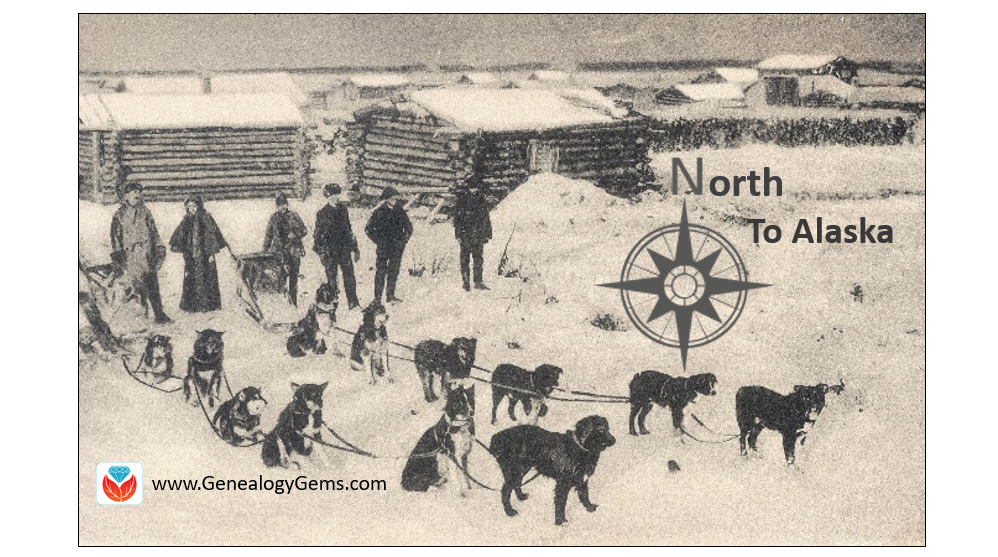
The National Archives is celebrating the sesquicentennial (150 years) of the Alaska Purchase with a special Hidden Treasure Alaska panoramic photography exhibit at the National Archives at College Park. It will also include a presentation by the exhibit curator, a musical program at the National Archives Museum in Washington, DC, and a loan to Polar Bear Garden exhibit at the Anchorage Museum. The National Archives programs and exhibit are free and open to the public.
The Musical Program
The musical program will be held on Thursday, March 30, at 7:30 p.m. at William G. McGowan Theater, Washington, DC. On March 30, 1867, U.S. Secretary of State, William Henry Seward, signed the Alaska Treaty of Cession that purchased Russian America. To commemorate the life and contributions of Seward, the State of Alaska is sponsoring a performance of the Alaska chamber group, Wild Shore New Music. Wild Shore will perform the work of living composers who have found inspiration through their experiences with the natural beauty and indigenous cultures of Alaska. Reservations are recommended and can be made online.
The Exhibit
The Hidden Treasure exhibit will be at the National Archives at College Park, MD, on the lower level. Hidden Treasure dramatically captures the beauty of Alaska, as captured on film by U. S. Geological Survey (USGS) topographers from 1910-1932. These extraordinary images of more than 6,000 panoramic photographs from the collection were used, but then stored and remained unseen for decades. Thanks to the research, work, and photographic skill of National Archives expert Richard Schneider, these images can now be seen by the public in their original panoramic format for the first time. These images capture work-life in the Alaskan wilderness, surveying techniques, towns, and geological formations, such as the Columbia Glacier. See Richard Schneider’s related Prologue Magazine story: The Alaskan Frontier in Panorama – How the National Archives Preserved Early 20th-Century Photographs.
Schneider will discuss these historic panoramic photographs of the Alaska Territory in his presentation on Wednesday, April 12th at 2 p.m. EST. You may see it live streamed at the William G. McGowan Theater & YouTube.
Polar Bear Garden
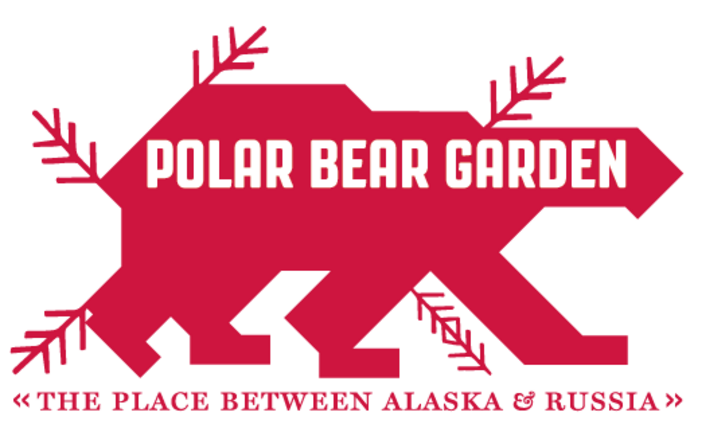 Beginning March 3rd through September 17, 2017, The Polar Bear Garden exhibit will be on display at the Anchorage Museum in Anchorage, Alaska.
Beginning March 3rd through September 17, 2017, The Polar Bear Garden exhibit will be on display at the Anchorage Museum in Anchorage, Alaska.
Archival and contemporary photographs combined with nesting dolls, cartoons, feature-length films, and Cold War propaganda will take viewers on a journey between Alaska and Russia since the purchase. It will further explore stereotypes, language, storytelling, boundaries, and crossings. The exhibit highlights are on rare loan from the National Archives and include the original cancelled check and President Andrew Johnson’s Ratification of the Treaty. More information about the Polar Bear Garden can be found online.
Alaska Genealogy
Your Alaskan heritage will likely include stories of great strength and perseverance. To begin your Alaska genealogy research, you may wish to review the FamilySearch Wiki article titled Alaska, United States Genealogy. In it, you will learn important tips like the fact that Alaska is not divided into counties, as nearly all the other states are. Instead, Alaska is divided into boroughs.
There is also a free guide on the wiki titled Step-by-Step Alaska Research, 1880-Present that you may particularly helpful. Among other things, it will help you located birth, marriage, and death records; wills and probates; and naturalization and immigration records.
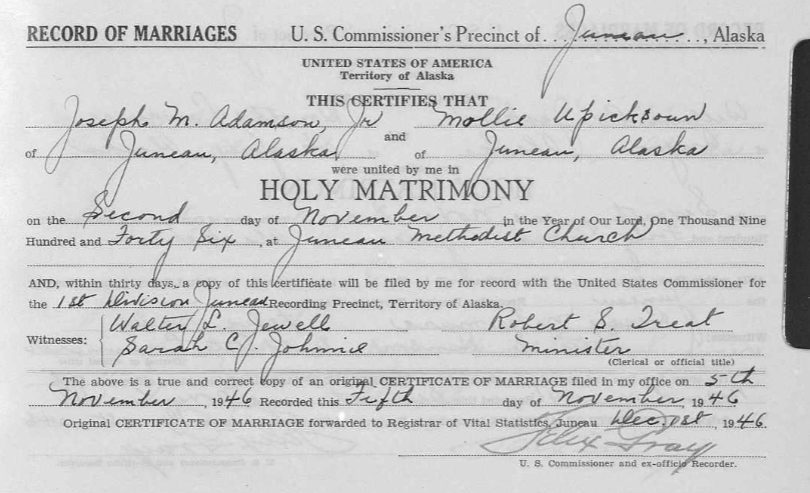
Marriage record found online at FamilySearch.org in collection titled “Alaska, Vital Records, 1816-1959”
Additionally, the Alaska State Archives have resources available. They hold many records that contain information on individuals such as:
- Naturalization records (1888-1972)
- Pioneer Home Residents (1913-1980)
- Probate Index (1883-1960)
- Teacher records (1917-1959)
- World War I Veterans (1913-1923)
- Vital Statistics (1816-1998)
Lastly, check out the Alaska Genealogy online guide provided by the Alaska State Library. This basic guide of Alaska related genealogy resources is not intended to be comprehensive, but it is certainly a step in the right direction. Sources for several of the boroughs may be available in other Alaska libraries or through interlibrary loan at your local library. They include:
- Anchorage Sources
- Fairbanks Sources
- Juneau Sources
- Kenai Peninsula Borough Sources
- Other Alaska Town
More Resources for Alaska Genealogy Research
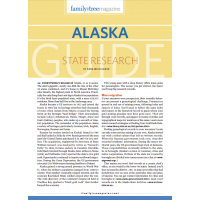 The Alaska State Research Guide Digital Download by Family Tree Magazine is a digital download you will want to have for your genealogy library. Trace your Alaska ancestors with the advice and resources in this four-page download. It includes:
The Alaska State Research Guide Digital Download by Family Tree Magazine is a digital download you will want to have for your genealogy library. Trace your Alaska ancestors with the advice and resources in this four-page download. It includes:
- a how-to article detailing Alaska history and records, with helpful advice on tracking your family there
- the best websites, books and other resources for Alaska research, handpicked by our editors and experts
- listings of key libraries, archives and organizations that hold the records you need
- descriptions of the top historic sites for learning about your ancestors’ lives and times, including visitor information
- timeline of key events in the state’s history
- full-color map to put your research in geographical context
Happy hunting…or should I say mushing!
New year, new records for genealogy!
Kick off 2018 with a diverse group of new genealogy records to explore online this week! Included are historical and vital records for British genealogy, Irish newspapers, Scottish records, and Palestine naturalization applications.
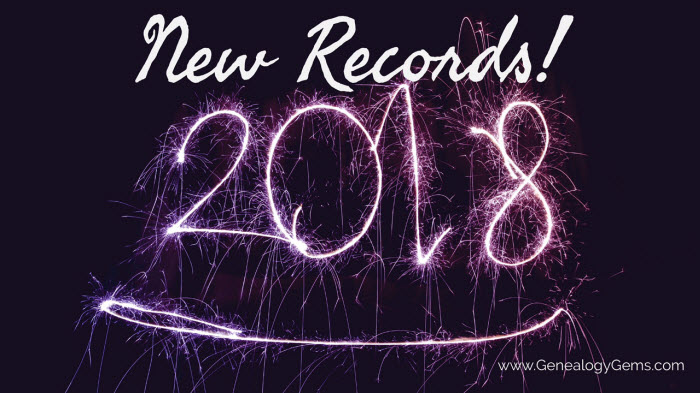
British Historical & Vital Records
Lots of new genealogy records are available for England this week at Findmypast! Start with Britain, Histories & Reference Guides, which contains more than 65 volumes about genealogy, heraldry, paleography, geography, and more. These volumes will expand your knowledge about your ancestor’s life and how your ancestors lived through the centuries.
Next, if you’ve got ancestors in Greater Manchester, you’ll want to explore Greater Manchester Burials 1570-1990 and Greater Manchester Marriages 1570-1936. Both collections pertain to the historic county of Lancashire and contain names, dates, and transcripts of the original registers. These collections both come from FamilySearch.
Finally, Northamptonshire Memorial Inscriptions may reveal your ancestor’s death date, burial place, as well as the names of other family members for your family tree. This collection includes 17 cemeteries, churchyards, and other places, and the records span from 1422 to 2015.
Irish Newspapers
The Church of Ireland’s record repository, Representative Church Body Library (RCBL), has announced that all 19th-century editions of the Church of Ireland Gazette have been added to the online archive of the weekly newspaper. The full archive is free to the public and covers years 1856 – 1923.
The British Newspaper Archive has added the Dublin Evening Telegraph to their collection of historic newspapers recently. This paper spanned 1871-1924, and this collection has over 12,000 issues available online.
Scottish Records
Recently added to Ancestry.com are Carnegie Music Institution Registers, 1910-1920 from Dunfermline, Fife. This school was founded through a trust set up by Andrew Carnegie, and school records include names, year and term of attendance, resident, and subject studied.
Additional news for Scottish research comes from the University of Virginia School of Law.
30 years after they acquired a trove of legal documents from Scotland’s Court of Session, the supreme legal court there, the Law School’s Arthur J. Morris Law Library is building a digital archive and reaching out to partners “across the pond” to open these legal history materials to scholars and the public. According to the press release, the library is planning to release the first batch of documents online soon. When completed, users will be able to search through a single document or the entire collection, peruse the rich data provided for each case, and download documents for free.
Palestine Naturalization Applications
A fascinating new collection at MyHeritage is the Mandatory Palestine Naturalization Applications, 1937-1947. From the collection description: “This collection is a unique and rich compilation of records documenting the efforts of individuals, mostly Jews, and sometimes their entire families, to establish citizenship in Mandatory Palestine, which was under British administration at the time. The collection contains photos, histories, passports, and other various forms providing details for each applicant.”
Let 2018 be your year to break down brick walls!
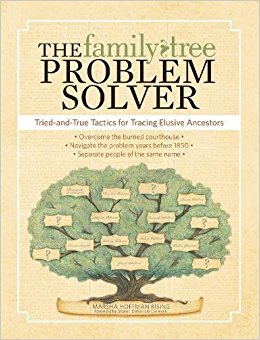 Has your family history research hit a brick wall? Marsha Hoffman Rising’s best-selling and recently updated book The Family Tree Problem Solver has the solutions to help you find the answers you seek. Get tips on finding vital records before civil registration, finding “missing” ancestors on censuses, advanced court records, workarounds for lost or destroyed records, common names, case studies, and more! This revised edition also includes new information about online research techniques and a look at the role of DNA research. Click here to order now!
Has your family history research hit a brick wall? Marsha Hoffman Rising’s best-selling and recently updated book The Family Tree Problem Solver has the solutions to help you find the answers you seek. Get tips on finding vital records before civil registration, finding “missing” ancestors on censuses, advanced court records, workarounds for lost or destroyed records, common names, case studies, and more! This revised edition also includes new information about online research techniques and a look at the role of DNA research. Click here to order now!
Disclosure: This article contains affiliate links and Genealogy Gems will be compensated if you make a purchase after clicking on these links (at no additional cost to you). Thank you for supporting Genealogy Gems!
Episode 144 – Digitize, Organize, and Archive
[iframe src=”http://html5-player.libsyn.com/embed/episode/id/2121515/height/100/width/480/thumbnail/yes” height=”100″ width=”480″ scrolling=”no”]Today’s gem focuses on a challenge that we all face as family historians – getting organized, archiving all of our stuff, and digitizing materials an d photos. I know that’s biting off a big chunk, but it’s such an important one. And in this episode I’m going to start to break it down for your with the help of the Family Curator, Denise Levenick who has written a book called How to Archive Family Keepsakes. She’s got lots of practical advice to share.
NEWS:
FamilySearch recently announced that their U.S. Immigration and Naturalization Community Project is Half-way to its 2012 Goal of 30 Million Records
In August of this year, FamilySearch announced its next major U.S. community project-U.S. Immigration and Naturalization. The project will create an extensive, free, online collection of U.S. passenger lists, border crossing records, naturalization records, and more-invaluable to genealogy researchers. See what U.S. Immigration and Naturalization projects are currently underway, or check on their status at FamilySearch.org/immigration.
You can join the community of online indexers and arbitrators helping to make passenger lists and naturalization records freely searchable on familysearch.org.
Current and Completed Projects
To view a list of currently available indexing projects, along with their record language and completion percentage, visit the FamilySearch indexing updates page. To learn more about individual projects, view the FamilySearch projects page.
Canadian Military Records
Ancestry.ca has also announced that they have launched some New Canadian Military Records Collections
Read about it on my Blog: Limited Time Free Access to Canadian Military Records, and New Records Online
Google recently announced that Google Maps just got the biggest Street View update ever, doubling the number of special collections and updating over 250,000 miles of roads around the world. Google has increased Street View coverage in Macau, Singapore, Sweden, the U.S., Thailand, Taiwan, Italy, Great Britain, Denmark, Norway and Canada. And they are launching special collections in South Africa, Japan, Spain, France, Brazil and Mexico, among others. .
They’ve also recently updated the Google Earth satellite imagery database. This refresh to the imagery has now been updated for 17 cities and 112 countries/regions. So Google Earth has never been better for genealogy research. And of course if you would like to learn more about what Google Earth can do for you as a genealogist, check out my free YouTube videos which show you what you can learn in Google Earth for Genealogy Video Tutorial Series.
Genealogy Gems Premium Membership Update
I’m happy to let all of you Premium members know that I’ve put together a quick little video that will walk you through the process of setting up your Premium podcast feed in iTunes.You’ll find a link on the premium episodes page once you’ve signed in that will take you to the video and instructions for setting up your Premium iTunes subscription.
I have also added a video recording of one my most popular classes to the Premium Videos collection. It’s called How the Genealogist Can Remember Everything with Evernote.
From Premium Member Kelly: “Thank you so much for your podcast on Evernote. I’ve been on YouTube watching videos about it but they were hard to follow and more advanced or to techie. Your podcast was easy to follow and went over the basics and I really appreciate that. I think I finally ready to try it.”
If you would like to be able to watch the Evernote class from the comfort of your own home please join us as a Genealogy Gems Premium Member which you can do at www.genealogygems.com
MAILBOX:

From Patience: “I have noticed in your podcast, other’s podcasts, blogs, and at workshops I have attended that there is a concern about the next generation. I do understand, but I wanted to share with you my experience in hopes of easing everyone’s worries. I am 23 years old, and let me tell you I stick out like a sore thumb at workshops as I usually am the youngest by at least 30 years. That being said when I started researching I met one of my cousins on ancestry.com, and we really hit it off we have all the same interests and are like long lost twins. For a while, I assumed that she was retired, and much much older than I, but after several emails, I found out she is only two years older than me!!!
I too worry about my generation, but I think after some maturing, most will at least have an appreciation for the past, and everything it has to offer, or at least I hope…But all I know is that there are two very pretty twenty-something girls thousands of miles apart that would rather research and learn that go to parties…so that seems pretty hopeful I think.”
Jennifer Takes the iPad on the Road
“Kudos for turning me on to a nifty iPad shortcut. Your latest book has some tips in the back, which is where, of course, I skipped to after dutifully reading the first three chapters or so. The tips about swiping the comma/exclamation point to create an apostrophe, and the other shortcut for quotation marks, are so great! I will no doubt find many other useful items when I return to reading. Honestly, your books are so full of wonderful information, I have to take a break before my head explodes (not pretty).”
Pat Oxley, a Genealogist on Facebook posted her review of my new book on Facebook last week. “Despite another day of coughing and basically feeling yuk, I bought and downloaded Lisa Louise Cooke‘s new book “Turn your iPad into a Genealogy Powerhouse.” It is FABULOUS! I worked my way through the book, taking notes and then downloaded and played with some of the apps she suggested! Thank you Lisa Louise! I will say it’s a terrific book even if you’re NOT a genealogist. Many of her suggested apps could be applied to many different hobbies and interests. You can buy it through Lulu.com.”
GEM: Interview with author Denise Levenick, The Family Curator
Archiving, organizing and digitizing family treasures is one of the greatest challenges for genealogists. In her book How to Archive Family Keepsakes: Learn How to Preserve Family Photos, Memorabilia and Genealogy Records, Denise Levenick presents a game plan that breaks down the steps and provides a clear picture of the end goal. The worksheets and checklists provide the kind of practical advice I look for in “how to” books. No fluff, just common sense, and usable information that lead to success.
Get your copy of Denise’s book How to Archive Family Keepsakes: Learn How to Preserve Family Photos, Memorabilia and Genealogy Records and start getting organized now!


Denise May Levenick is a writer, researcher, and speaker with a passion for preserving and sharing family treasures of all kinds. She is the author of How to Archive Family Keepsakes and creator of The Family Curator blog http://www.TheFamilyCurator.com, voted one of the 40 Best Genealogy Blogs in 2010 and 2011.
Gem: One More Thing
From Tina in the UK: “Your recent blog post about items found when clearing out a house reminded me of my most significant find in my stepfather’s attic. He died in July 2009 and my mother wanted to clear out and sell their big house and move to a retirement flat to be near the family in Bristol. I should explain that my mother and father divorced when I was a baby and my stepfather was like a father to me. We threw out masses of stuff – he never did, EVER! – but this was mostly correspondence, company reports for all his shares etc which we sifted through without much of note being found. Then, in the attic there were two extraordinary finds:
(1) a box full of the small notebooks he kept from his schooldays till a few years before he died…early ones and especially the ones of his years in the Army in India and Burma…The later notebooks are a record of his expenses – with dates, items and expenses which brought back many memories (eg doll for Tina – bought in New York on holiday in 1958 – I remember it well, it was a sort of pre-Barbie!). Every ice-cream he ever bought us – there was a LOT of ice-cream (he loved it)!
(2) my grandfather’s old attache case – full of letters from my stepfather’s mother between about 1978 and her death in 1993. There were hundreds of them – and yes, I read every single one and they have formed the basis of the story of her life (yes, she also left a small diary, a collection of her own recipes of family favourites, and a very simple family tree), which I am now writing…what VERY little there was seemed to be in answer to some of his questions…It just shows how the smallest things can provide clues.”
Thank you Tina for sharing this – it certainly does remind us that clues can come from anywhere. But it also reminds us of something else – that while it’s wonderful to have our history recorded so it can be remembered, sometimes it’s the smallest things that are remembered most: Like ice cream. I think I’m going to sign off now and take my grandson Davy out for a cone. I hope he remembers it, because I know I will. Who will you invite out for a an ice cream and spend your precious time with today?
Disclosure: This article contains affiliate links and Genealogy Gems will be compensated if you make a purchase after clicking on these links (at no additional cost to you). Thank you for supporting Genealogy Gems!
RootsTech 2011: A bold fresh face on the genealogy conference scene 2/10/11
RootsTech 2011 is already proving to be a bold and innovative approach to genealogy conferences. There’s an exciting buzz in the exhibit hall as the 2000+ attendees navigate their way through the high tech displays and interactive experiences.
On this first day I’ve been focused on producing interviews that will make their way to the Genealogy Gems Podcast, YouTube Channel and Genealogy Gems apps. Already in the can are interviews with Curt Witcher, Manager of the Allen County Public Library Genealogy Dept., Patricia Van Skaik of the Public Library of Cinncinati, and Jan Gow of Aukland, New Zealand. And there are many more scheduled. Stay tuned to the podcast!
Here’s the official press release on Roots Tech just in case you’ve been living under a rock!
SALT LAKE CITY—FamilySearch has been helping people find their ancestors for over 100 years, but the non-profit, volunteer-driven organization has never participated in anything quite like this before. FamilySearch is hosting a new annual conference called RootsTech that begins in Salt Lake City today. The goal of RootsTech is to foster innovation in the world of genealogy technology. Keynote addresses will be streamed complimentary at RootsTech.org, and Twitter users can follow real-time updates using #rootstech.
“FamilySearch is committed to working with others to provide the records and resources that help people discover their family history,” Jay L. Verkler, chief executive officer of FamilySearch said. “We believe that one of the best ways to achieve that goal is to encourage new technologies that can make it even easier for people to find their ancestors.”
RootsTech grew out of an effort Brigham Young University began several years ago with its Conference on Computerized Family History and Genealogy. BYU is now a key partner in this new conference, along with other leaders in genealogy and technology including Microsoft, Dell, FamilySearch, Ancestry.com, brightsolid, the New England Historic Genealogical Society, the Federation of Genealogical Societies, and the National Genealogical Society.
Nearly 3,000 people are expected to attend RootsTech, which will be held in the Salt Palace Convention Center. The unique conference appeals to genealogists of all skill levels, who can learn new technology-based approaches to their research. The event will also attract the creators of genealogy-related technology, who can get feedback from peers and users on their ideas and creations.
RootsTech will help developers and others who create technology that is used by a broad swath of family history consumers to learn about the challenges facing the genealogy community. According to Verkler, that’s what makes this conference truly unique.
“The purpose of RootsTech is to encourage innovative technology solutions in the fields that have a bearing on genealogists. Therefore attendees will find that the conference topics and discussions apply to a wide variety of disciplines,” Verkler said.
The format of RootsTech is designed to encourage collaboration and discussion. There will be a variety of classes and hands-on workshops for both genealogists and technologists, as well as demonstrations and virtual sessions. Verkler will be one of the keynote speakers at the conference, along with several other leaders in the technology and genealogy world:
· Shane Robison – Executive Vice President and Chief Strategy and Technology officer at Hewlett-Packard
· Brewster Kahle – founder of the Internet Archive and the Open Content Alliance
· Curt Witcher – Historical Genealogy Department Manager, Allen County Public Library in Fort Wayne, Indiana





